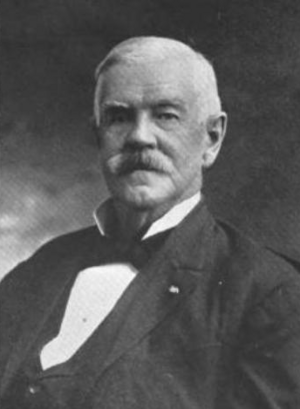Charles R. Brayton facts for kids
Quick facts for kids
Charles Ray Brayton
|
|
|---|---|
 |
|
| Born | August 16, 1840 Warwick, Rhode Island
|
| Died | September 23, 1910 (aged 70) Providence, Rhode Island
|
| Resting place | Swan Point Cemetery |
| Occupation | Politician, lobbyist |
| Political party | Republican |
| Spouse(s) |
Antoinette Percival Belden
(m. 1865) |
Charles Ray Brayton (born August 16, 1840 – died September 23, 1910) was an American politician and lobbyist. A politician works in government, and a lobbyist tries to influence government decisions. Brayton was a member of the Republican Party. The New York Times newspaper once called him the "Blind Boss of Rhode Island." This nickname compared him to William "Boss" Tweed, another powerful political leader from New York City.
Contents
Life Story of Charles Brayton
Charles R. Brayton was born in Warwick, Rhode Island. His parents were William Daniel Brayton and Anna Maud (Clarke) Brayton. In 1857, his father became a Republican representative for Rhode Island in the U.S. Congress. This is where laws are made for the country.
In 1859, Charles started attending Brown University in Providence. However, he left school during his second year. He joined the 3rd Rhode Island Heavy Artillery to fight in the Union Army during the American Civil War.
Military Service
Charles Brayton became a first lieutenant in 1861. This is an officer rank in the army. He was promoted to lieutenant colonel in 1863. Then, in April 1864, he became a colonel. He left the army honorably in October 1864.
In March 1865, he received an honorary promotion called a "brevet" to the rank of brigadier general. This means he was given the title but not the full duties or pay of that higher rank. A month before the Civil War ended, he married Antoinette Percival Belden.
Starting in Politics
After the war, Brayton became a captain in the 17th Infantry Regiment of the Regular Army in March 1867. He resigned a few months later. He was then appointed postmaster of Port Royal, South Carolina. A postmaster is in charge of a post office.
He held several other government jobs. Later, he returned to Warwick to become the Township Clerk. His father had also held this position. In 1870, President Ulysses S. Grant offered him a job as a Consul to County Cork in Ireland. A consul represents their country in another nation. Brayton turned down this offer.
In 1874, he became the Postmaster of Providence. In 1880, he was named Chief of the Rhode Island State Police.
Becoming a Political Leader
Brayton became the chairman of the Republican State Committee. This position gave him a lot of power. For almost 30 years, he was the main leader, or "boss," of Rhode Island's Republican political system. He had a lot of influence over decisions.
In 1896, he joined the Republican National Committee. This is a group that helps lead the Republican Party across the country. He was also a delegate to the 1900 Republican National Convention. At this meeting, they chose William McKinley to run for president again.
Losing His Eyesight
In 1900, Brayton started to have problems with his eyes. He developed cataracts, which are cloudy areas in the lens of the eye. In 1901, he had an operation that was not successful, and one of his eyes had to be removed. As his cataracts got worse, he became almost completely blind in his other eye. This is why he was called the "Blind Boss."
The "Brayton Act"
In 1901, the Republican party in Rhode Island was divided. This happened after Governor William Gregory died. Brayton pushed for a new law to be passed. This law would shift power from the Governor's office to the State Senate. The State Senate was controlled by Republicans.
This new law became known as the "Brayton Act." It gave almost all the power to appoint people to government jobs to the State Senate. It limited the Governor to only choosing his own private secretary and a few minor officials. This law helped the Republicans keep power. It was especially useful when Democrat Lucius F. C. Garvin was elected Governor in 1903. The "Brayton Act" stayed in effect until 1935. That year, Democrats gained control of the State Senate in an event called the "Bloodless Revolution."
Later Years and Death
Brayton tried to help Samuel P. Colt get elected to the United States Senate. However, the current Republican senator, George P. Wetmore, kept his seat. This struggle left one of Rhode Island's Senate seats empty for a while.
In July 1907, Brayton resigned from a leadership position in the Republican Party. He left his offices in the State House later that year. He said he stayed to show he would not give in to the Governor's demands.
General Brayton was a member of several groups. These included the Military Order of the Loyal Legion of the United States and the Society of Colonial Wars. These were organizations for military officers and people interested in colonial history. He was also very active in the Grand Army of the Republic, a group for Civil War veterans.
Charles Brayton died in Providence on September 23, 1910. He passed away from diabetes and problems from a broken hip he got in a fall. He is buried in Swan Point Cemetery in Providence.

